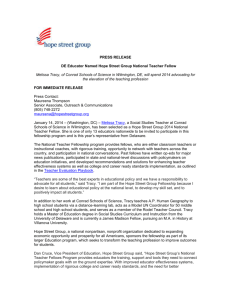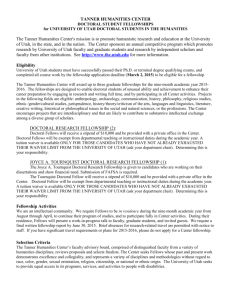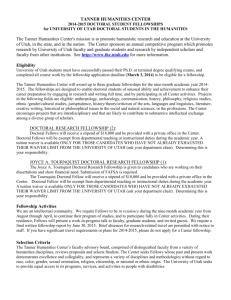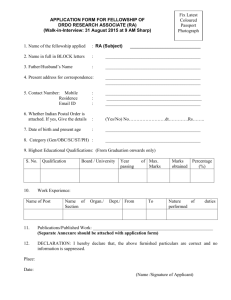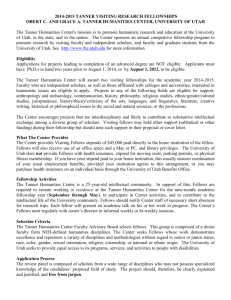Grad Fellowship appl. 96-97
advertisement
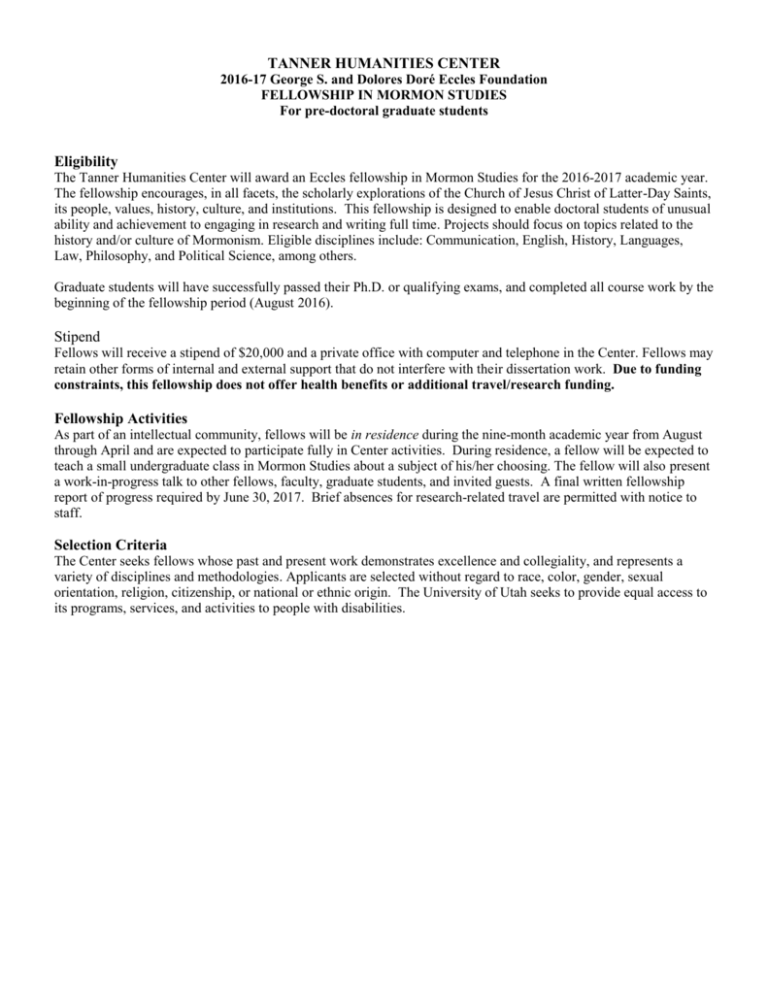
TANNER HUMANITIES CENTER 2016-17 George S. and Dolores Doré Eccles Foundation FELLOWSHIP IN MORMON STUDIES For pre-doctoral graduate students Eligibility The Tanner Humanities Center will award an Eccles fellowship in Mormon Studies for the 2016-2017 academic year. The fellowship encourages, in all facets, the scholarly explorations of the Church of Jesus Christ of Latter-Day Saints, its people, values, history, culture, and institutions. This fellowship is designed to enable doctoral students of unusual ability and achievement to engaging in research and writing full time. Projects should focus on topics related to the history and/or culture of Mormonism. Eligible disciplines include: Communication, English, History, Languages, Law, Philosophy, and Political Science, among others. Graduate students will have successfully passed their Ph.D. or qualifying exams, and completed all course work by the beginning of the fellowship period (August 2016). Stipend Fellows will receive a stipend of $20,000 and a private office with computer and telephone in the Center. Fellows may retain other forms of internal and external support that do not interfere with their dissertation work. Due to funding constraints, this fellowship does not offer health benefits or additional travel/research funding. Fellowship Activities As part of an intellectual community, fellows will be in residence during the nine-month academic year from August through April and are expected to participate fully in Center activities. During residence, a fellow will be expected to teach a small undergraduate class in Mormon Studies about a subject of his/her choosing. The fellow will also present a work-in-progress talk to other fellows, faculty, graduate students, and invited guests. A final written fellowship report of progress required by June 30, 2017. Brief absences for research-related travel are permitted with notice to staff. Selection Criteria The Center seeks fellows whose past and present work demonstrates excellence and collegiality, and represents a variety of disciplines and methodologies. Applicants are selected without regard to race, color, gender, sexual orientation, religion, citizenship, or national or ethnic origin. The University of Utah seeks to provide equal access to its programs, services, and activities to people with disabilities. Application Process A Graduate Fellowship application consists of five parts: 1) Electronic copy of the application materials arranged in the following order: a) the application cover page, b) an abstract (100 words, single-spaced) of the proposed project, and c) a brief description (double-spaced, not to exceed 1000 words) of the dissertation project that follows "description format" guidelines listed below, and d) a current curriculum vitae. 2) Two (2) letters of recommendation: a) one letter from the chair of the supervisory committee and, b) one letter from a scholar working in the student's area of study who is familiar with the student’s proposed research project. Please ask your department’s or program’s graduate director to submit a letter acknowledging that you are a graduate student in good standing in the program. Please ask your department or program to send a dated copy of the your qualifying exam sheet signed by the supervisory committee indicating "pass." All documents must be electronically to Beth Tracy, Associate Director, at beth.tracy@utah.edu by the March 1, 2016 deadline. Description Format The project should be clearly explained and justified and free from jargon. We will not consider proposals that exceed the 1000 word limit. The proposal should address the following points in order. Please label each section, paginate, and double-space throughout. a) The specific questions, problems, or ideas you will examine and the objectives or results you hope to achieve. b) A detailed but concise description of your methodology, approach, and/or procedures. You should make clear how your methods will lead to achieving your project objectives. c) Justification for your project. What contribution is the project likely to make, and what is its significance for the humanities? d) How does the project fit into existing scholarship in the field? What is its relationship to the work of others in the same area? What is distinct and original about the proposed project? e) What is the current state of the project? What is your proposed schedule or specifically laid-out work plan for the fellowship period? ON OR BEFORE March 1, 2016 submit an electronic copy of the completed proposal to Beth Tracy, Associate Director, beth.tracy@utah.edu. The Center will notify applicants by April 30, 2016. For further information send questions via e-mail to beth.tracy@utah.edu or telephone the Center at (801) 581-7989. TANNER HUMANITIES CENTER 2016-17 FELLOWSHIP IN MORMON STUDIES Name: Address: e-mail address: Telephone: (home) Department: (other) Field of Specialization: Year Ph.D. or terminal degree program was begun: The title of your research project during fellowship year: Names, address, and telephone numbers of the two persons whom you have asked to send recommendations directly to the Tanner Humanities Center: 1. 2. I waive ( ), do not waive ( ), my right to have access to these letters of reference. Applicant's Signature Date Send all required materials by March 1, 2016 to Beth Tracy, beth.tracy@utah.edu TANNER HUMANITIES CENTER, UNIVERSITY OF UTAH Instructions for Referees of Doctoral Fellowship Applicants It would be helpful to the Center's review panel (most of whom will be outside of this field) if you commented specifically on the applicant's proposed project while keeping in mind the following selection criteria: •the conception and definition of the research or writing project; •the project's contribution to the field in specific terms of the work’s significance and originality; •the capability, based on past performance, of this candidate to undertake and complete this project within or shortly after the period of fellowship residency; •the applicant’s writing and analytical abilities, work plan and methodology; and The Center strives to create an environment for positive intellectual and humanistic exchange. Please comment on the candidate's collegiality and ability to work and interact effectively with fellows, faculty, staff and students, and the likelihood that this candidate will be a full participant in the Tanner Humanities Center. Please send your letter of reference directly to Beth Tracy, beth.tracy@utah.edu The deadline for RECEIPT of reference letters is March 1, 2016
